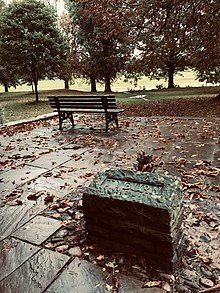Human settlement in England
| Knavesmire | |
|---|---|
 Path on the edge of the Knavesmire Path on the edge of the Knavesmire | |
 | |
| OS grid reference | SE592499 |
| Unitary authority | |
| Ceremonial county | |
| Region | |
| Country | England |
| Sovereign state | United Kingdom |
| Post town | YORK |
| Postcode district | YO23 |
| Police | North Yorkshire |
| Fire | North Yorkshire |
| Ambulance | Yorkshire |
| 53°56′31″N 1°05′53″W / 53.94204°N 1.09812°W / 53.94204; -1.09812 | |
The Knavesmire is one of a number of large, marshy undeveloped areas within the city of York in North Yorkshire, England, which are collectively known as Strays. Knavesmire, together with Hob Moor, comprises Micklegate Stray. The York Tyburn, the site of a gallows administered on behalf of The Crown by York Castle, was situated in the area adajcent to the Tadcaster Road.
It has been suggested that the name 'Knavesmire' may share a derivation with Knaresborough—Cenward's mire.
History
Situated in the south-west of the city, some distance outside the historic walls, Knavesmire's low-lying position makes it liable to severe flooding in times of heavy rain. As a consequence, it remained undeveloped as the city expanded around it.
The Knavesmire was the site of York Golf course for many years.
During the Second World War, parts of the Knavesmire were farmed, while other parts were used for military purposes including an anti-aircraft battery and a prisoner of war transit camp which was located near the grandstand.
Knavesmire was also the site of Knavesmire Secondary School, which then became one of the campuses of The College of Law till 2014. Millthorpe School uses the Knavesmire for cross country running. Knavesmire Primary School is located on Campleshon Road, at the southern end of Knavesmire Road. In 1864 a letter was sent to the York press from H. J. Jenkinson of the Leeds football club suggesting that the citizens of York form a football team and that they should play a friendly match on Knavesmire.
Between 2009 and 2022, it was also home to Yorkshire's largest beer festival. The annual York CAMRA Beer & Cider Festival was held in a marquee on Knavesmire opposite the Grandstand.
York gallows


For many years, Knavesmire was the site of public hangings in York. The gallows were erected in 1379, a few miles outside the city on the main southern approach road (now known as the A1036 Tadcaster Road). The execution site was often referred to as "York Tyburn" after the original Tyburn gallows in Middlesex.
Probably the most famous people to be executed there were Rhys ap Maredudd, a Welsh nobleman and rebel, hanged in 1292, and Dick Turpin, who was hanged in 1739. Catholic priests Alexander Rawlins and Henry Walpole were hanged, drawn and quartered on 7 April 1595. Another Catholic priest, Nicholas Postgate, was hanged, drawn and quartered there in 1679. One of the last women to be burned at the stake was Elizabeth Broadingham, who had already been killed with her lover, in 1790.
By the beginning of the 19th century, it was felt that the gallows did not create a good first impression for visitors to the city. The last hanging at Knavesmire was in 1801, after which the gallows were moved to a more discreet (although still public) location near the castle. A paved area with a small plaque today marks the position in which the scaffold stood.
Current usage

The Knavesmire is used for recreation and for public events. It is a popular site for dog-walking, and a large part of it is occupied by York Racecourse. The York Races were first moved to the Knavesmire from Clifton in 1731. Since January 2012 it has been the location of the York Parkrun, a free 5k running event held every Saturday morning.
The Little Knavesmire is the home of Ovington CC.
References
- "Common Lands and Strays". british-history.ac.uk. Retrieved 24 May 2022.
- "York Tyburn - York's Historic Place of Execution". www.britainexpress.com. Retrieved 29 October 2024.
- Location of York Tyburn53°56′47″N 1°06′05″W / 53.94634°N 1.101469°W / 53.94634; -1.101469 (Location of the York Tyburn)
- ^ "Exploring The Knavesmire York" (PDF). dlhg.weebly.com. Retrieved 27 August 2013.
- MacRae, Claire (November 2013). Sydes, Bob (ed.). City of York Historic Characterisation Project - 2013, Character area statements (PDF) (Report). City of York Council. Retrieved 20 May 2019.
- "Food, music, a special guest and 40,000 pints – York Beer Festival is back". YorkMix. 4 September 2017. Retrieved 20 April 2018.
- "York Beer Festival 2016: What you should know - and what you should drink..." York Press. 14 September 2016. Retrieved 20 April 2018.
- ^ "Horse Racing in York". www.historyofyork.org.uk. Retrieved 6 February 2012.
- "Executions in York". History of York. York, England: York Museums Trust. Retrieved 5 March 2015.
- Brandon, Ed (2011). Curiosities of York. Amberley. ISBN 978-1445627717.
- ""Henry Walpole S.J.", The Jesuits in Britain". Archived from the original on 21 August 2018. Retrieved 3 February 2019.
- Matthew, H. C. G.; Harrison, B., eds. (23 September 2004), "The Oxford Dictionary of National Biography", The Oxford Dictionary of National Biography, Oxford: Oxford University Press, pp. ref:odnb/65513, doi:10.1093/ref:odnb/65513, retrieved 11 February 2023
- Lewis, Stephen (24 August 2009). "Grim past of Knavesmire as the site of the York gallows". York Press. Retrieved 2 December 2023.
- Bannister, Judith (17 August 1968). "Racing prizes from the past". The Times. No. 67332. p. 16. ISSN 0140-0460.
- "Sign hung at site of famous gallows". The Yorkshire Post. 28 April 2011. Retrieved 2 December 2023.
- "York parkrun". www.parkrun.org.uk. Retrieved 5 February 2012.
| Parks and open spaces in York | |
|---|---|